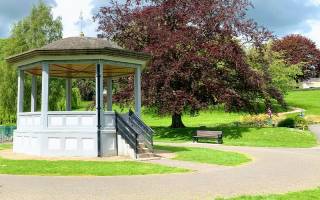Popular use of outdoor public space has expanded since the beginning of the Covid-19 Crisis. By focusing on outdoor music, this project explores the social history of the outdoor spaces local to UCL -

Using historical and musicological research methodologies, including use of archives and rare books in UCL Special Collections’ London History Collection, this exploration will lead to a public acoustic musical performance of classical, baroque and traditional English folk music. We are interested in the ways in which various outdoor musical traditions have had different roles in responding to or colluding with the state and economic power exerted by public spaces upon individuals, and seek to explore the sonic politics of public space in relation to discourses around labour, imperialism and immigration.
Outdoor musical traditions
The history of outdoor musical traditions in central London ranges from employers providing musical entertainment in the Embankment gardens for print workers during lunchbreaks, to outdoor musical traditions of resistance and protest, to the brass bands of factory, utilities and theatre workers in Victorian and 20th-century London. Contemporary audiences at central London’s bandstands would have experienced music such as the Victorian sheet music of Warwick Williams and Carl Armbruster’s entr'actes programmes. Our programme development will draw on these and on traditions beyond the bandstand, from the ‘Forest Operas’ of Germany and France to J.S. Bach’s cantatas famously performed in the town squares of Leipzig, to the marching folk songs of the Chartists and others. We will also tie in current research and debates on music therapy and embodied auditory cognition in urban environments. The project’s outcome - a bandstand design and musical programme - will apply these issues to a real outdoor performance in the context of Bloomsbury’s squares.
Bloomsbury’s garden squares
Research towards the performance will be informed by the social history of Bloomsbury, its squares and their use, and the aesthetic and architectural roles they have played in the formation and perpetuation of imperialist ideology. We’ll consider how far Bloomsbury landscape gardeners and architects such as Humphrey Repton (Russell and Bloomsbury Squares) and William Wilkins (UCL Wilkins Building) formed trans-Atlantic imperialist imaginaries of Britain (such as Repton’s creation of Chinese and American-themed gardens for the Duke Of Bedford on whose estate Bloomsbury was built, or Wilkins’ work for the East India Company and his involvement with the slave-owning Baring family). These contexts also illuminate the ways in which different immigrant and refugee communities have and continue to disrupt this imperialist legacy and the dialectical ways in which spatial power is negotiated – music playing a vital role in this process. These considerations contextualise our focus on the history of bandstands. These highly ornamented, often circular, covered outdoor stages arose as spaces for working-class entertainment as a response to the brutalities of the Industrial Revolution. They also represent a dialectical cultural struggle between employers wishing to increase workers’ productivity by providing them with the comfort of green spaces and entertainment, and workers’ own needs for musical self-expression, a cultural need which often took on radical qualities of proletarian cultural self-assertion.
Commission
We intend to commission, through a competition open to students of the Slade and Bartlett, a design or conceptualisation of a bandstand which can demarcate the space for outdoor musical performance. This could be anything from a physical structure, to a floor-piece that delineates performative space, to a mobile or digital bandstand, to a sound piece that pulls audiences to a certain point of performance. As the realisation of a physical structure from the winning concept is likely to be too expensive for this project, we would encourage proposals that could be realised through, for example, a demarcation of existing public spaces or existing structures within them, including elements of the natural environment.
Performance
The final result will be a performance drawing on folk, classical and baroque repertoire, although we envisage collaboration and exchange between performers in each genre so that programme items are informed by one another and by the research phase of the project, which could result in a mixed-genre programme. The performance will be followed by a discussion event in the Music Futures festival.
See event listing for the performance and discussion.
Legacy
The COVID-19 pandemic has resulted in the cancellation or restriction of a whole range of musical performances at UCL that would ordinarily have taken place indoors and been open to local residents and employees, as well as other members of the public and the University. We hope that part of the legacy of this project will be to overcome this cultural poverty by offering solutions for future outdoor musical performances organised by UCL that are grounded in the history of the people and spaces that surround the University.
Photo by Ronnie Khan on Unsplash
 Close
Close

